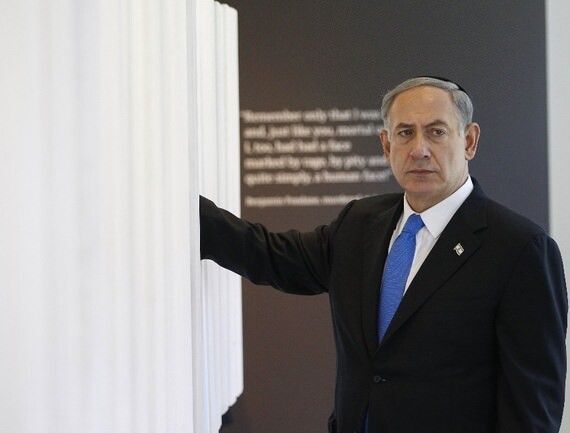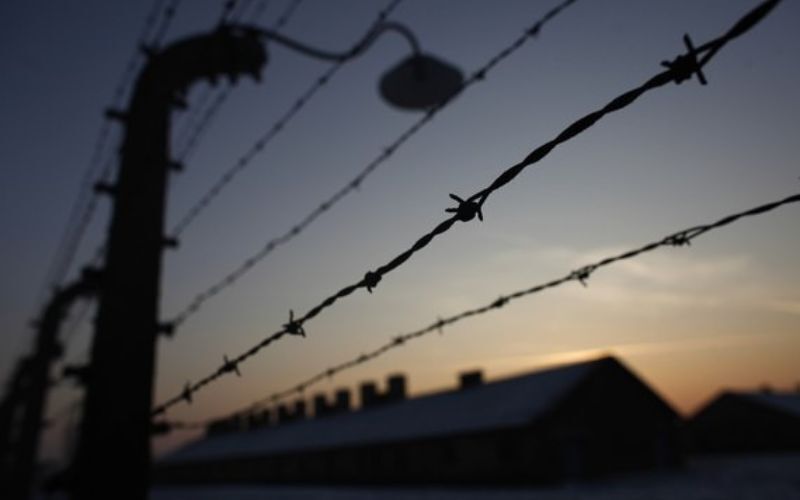Photo by Kacper Pempel/Reuters - A view of the former Nazi concentration camp of Auschwitz-Birkenau.
It is impossible for me to make believe that there was no human tragedy perpetrated against millions of Jews and non-Jews.
~ Zeina M. Barakat
In March, I was one of 27 Palestinian students who visited the Auschwitz-Birkenau death camps with Professor Mohammed S. Dajani Daoudi. When we returned from Poland, the condemnation of our trip—and of Professor Dajani himself—in the media, and on Facebook and Twitter, was deafening. Equally deafening was the silence of my fellow travelers, who were so cowed into muteness by the virulence of the criticism that only a couple came to Professor Dajani’s defense.
As the coordinator of the Palestinian team, I am now breaking this silence.
We went to Auschwitz out of the belief that deepening our knowledge of the Holocaust could help pave the road to peace.
For the last decade—ever since I enrolled in the American Studies program at al-Quds University in Jerusalem, received my master’s degree, and then moved to the other side of the desk to became a lecturer—Professor Dajani has been my teacher and mentor. Learning about the Holocaust—and its universal message about the threat of intolerance and genocide—has been a central theme of our work. Together, we co-authored with Martin Rau a book in Arabic on the Holocaust to create awareness of this most tragic event among Palestinians. We distributed the book both inside and outside the university, delivered lectures to civic groups, and showed films on the Holocaust in our workshops. More than once, we took our students to Israel’s Yad Vashem Holocaust museum and the U.S. Holocaust Memorial Museum in Washington. Finally, the time came to travel to Auschwitz-Birkenau.
When my fellow Palestinian travelers talk among themselves and with friends and family about the accusation that they “sold out to the Jews” by visiting Auschwitz, they tend to cite their love for their country, noting that their travel makes them no less patriotic or nationalistic than their critics. Although the public outcry has silenced most of them, they all went to Auschwitz out of the belief that deepening their knowledge of the Holocaust could help pave the road to peace. Not only did they choose to reject ignorance, but they displayed remarkable moral courage by choosing to respect the past suffering of “the other.”
Our experience reminds me of Plato’s “Allegory of the Cave.” The great philosopher asks you to imagine that you have been imprisoned all your life in a dark cave, with your hands and feet shackled and your head restrained so that you can only look at the wall in front of you. Behind you is a blazing fire, and between you and the fire there is a walkway where others move back and forth. The shadows cast on the wall by those objects are the only things you see. Those shadows become your reality. Suppose you are released from your shackles and freed to walk around the cave. Dazzled at first by the fire, you would gradually come to understand the origin of the shadows that you thought were real. Finally, you are allowed out of the cave and into the sunlit world, where you see the fullness of reality. But if you go back to the cave and tell others what you saw, will they believe you? No, they will condemn you. That is what happened to us, the Palestinian students who dared to visit Auschwitz. We simply left the cave.
Some of Professor Dajani’s colleagues believe this entire exercise has been a curse, given the attacks and criticism we have suffered since we returned home. Yet Professor Dajani, the eternal optimist, sees only a blessing in what we have done. We have opened a crack in the wall of ignorance. We have made Palestinians talk publicly about a topic that was once taboo.
This was not solely a Palestinian affair. Our program, titled “From Stone to Flesh,” was a joint effort of three institutions—Friedrich Schiller University of Jena, Tel Aviv University, and Ben Gurion University of the Negev—along with a Palestinian civil-society group founded by Professor Dajani called “al-Wasatia,” which means “moderation” in Arabic. The weeklong trip to Poland was funded by the German Research Foundation. Al-Quds University played no role in the program.
When we Palestinians returned from the unprecedented visit, a voyage that broke historic barriers of ignorance and misunderstanding, we were welcomed not with thanks and congratulations but with an explosion of criticism. Professor Dajani was the target of especially vicious attack by extreme Palestinian nationalists, who accused him of “selling out” to the Jews.
As an educator, Professor Dajani’s purpose in having his students learn about the Holocaust is to broaden their understanding of the psyche of “the other.” This builds upon a line from To Kill a Mockingbird that I remember him showing us in American culture class years ago. In the film, Atticus Finch turns to his daughter Scout and says: “You never really understand a person until you consider things from his point of view.... Until you climb inside of his skin and walk around in it.” It is the same idea that the Japanese call oyakudachi, which means, “walking in the shoes of the other.” Professor Dajani emphasized the importance of looking at the other person as if you are the other person. Only then can you truly understand how that person feels and why. Beyond this educational purpose, there was no political agenda to our trip.

Photo by Peter Andrews/Reuters. Israeli Prime Minister Benjamin Netanyahu looks at the Book of Names, which contains 4.2 million names of Jews killed during the Holocaust, at the Auschwitz-Birkenau State Museum in Poland.
As a doctoral student, it is impossible for me to make believe that there was no human tragedy perpetrated against millions of Jews and non-Jews during the Second World War. The Holocaust is a fact, and we all have a sacred responsibility to ensure that it never happens again to Jews or any other group. I believe our trip made a big crack in the Palestinian wall of ignorance and indifference about the Holocaust. The recent statement by Palestinian Authority President Mahmoud Abbas recognizing the Holocaust as the “most heinous crime” against humanity in modern history made another crack. Perhaps one day soon this wall will collapse.
I was born in Jerusalem in an Arab culture that, to put it mildly, ignores the Holocaust and avoids discussing it. As a young girl, I had to overcome social and educational restrictions to learn more about these closed chapters of history. Not only were books on the subject unavailable, but we were told that our responsibility as Palestinians was to memorize only what teachers told us, so as to reinforce our collective memory of loss and grievance and support our national identity and quest for a homeland.
However degrading and unfair our situation in Palestine is today—and yes, it is degrading and unfair—it pales in comparison to the dehumanizing evil perpetrated by the Nazis.
Many Palestinians link what happened to the Jews during World War II with the Nakba, the Arabic word for “disaster” and the term Palestinians use to describe the events of 1948, which led to their dispossession and the flight of hundreds of thousands of refugees. But those who argue that we Palestinians should close our eyes to the reality of the Holocaust because it was the cause of our national tragedy are wrong. They know nothing about Zionist history, from the First Zionist Conference in Basel, Switzerland, in 1897, to Britain’s Balfour Declaration calling for the establishment of a Jewish homeland in Palestine in 1917, through the British mandate in the 1920s, 30s, and 40s. And those who argue, as student-critics of our trip wrote on Facebook, that the injustice Palestinians currently face is of the same magnitude as what happened to Jews in Nazi-controlled Europe are wrong, too. However degrading and unfair our situation in Palestine is today—and yes, it is degrading and unfair—it pales in comparison to the dehumanizing horror, depravity, and evil conceived and implemented by Nazis and their collaborators.
Original article comes from: The Atlantic


